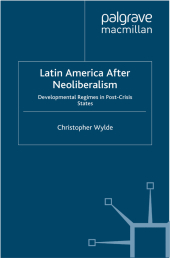 Neuerscheinungen 2012Stand: 2020-01-07 |
Schnellsuche
ISBN/Stichwort/Autor
|
Herderstra▀e 10
10625 Berlin
Tel.: 030 315 714 16
Fax 030 315 714 14
info@buchspektrum.de |

C. Wylde
Latin America After Neoliberalism
Developmental Regimes in Post-Crisis States
1st ed. 2012. 2012. xiii, 250 S. 235 mm
Verlag/Jahr: SPRINGER PALGRAVE MACMILLAN; PALGRAVE MACMILLAN UK 2012
ISBN: 1-349-33719-6 (1349337196)
Neue ISBN: 978-1-349-33719-4 (9781349337194)
Preis und Lieferzeit: Bitte klicken
Wylde analyzes Kirchnerismo in Argentina and the developmental regime approach in the political economy of development in Latin America. He shows the systematic way in which relationships between state-market, state-society, and national-international dichotomies can be characterised within a developmentalist paradigm.
Introduction: The Political Economy of Development and Crisis PART I: COMPARATIVE THEORETICAL PERSPECTIVES AND DEBATES The Rise of Developmentalism in Latin America: Beyond the Washington Consensus? From Developmental States to Developmental Regimes: Lessons from Asia for Contemporary Latin America PART II: SURVEYING THE LANDSCAPE: THE CASES OF ARGENTINA AND BRAZIL The Economic Policies of NÚstor Kirchner┤s Argentina 2003-2007 Argentina, Kirchnerismo, and Neodesarrollismo: Argentine Development under NÚstor Kirchner 2003-2007 The Economic Policies of Lula┤s Regime in Brazil Neoliberalism or Developmentalism? The Political Economy of Brazil 2003-2010 PART III: POST-CRISIS POLITICAL ECONOMY IN LATIN AMERICA: GLOBAL Lessons? Crisis and Post-Crisis States in a Regional and Global Comparative Perspective Conclusion: Continuity and Change in Post-Crisis Political Economy - The Rise of Latin America?
┤In the burgeoning literature on post-neoliberalism in Latin America, this book is sure to become a groundbreaking text. It develops a case for the significance of the new left that is both novel and convincing, seeing in it elements of continuity and change. Using the developmental regime as a theoretical framework, it offers for the first time a rationale that gives coherence to the actions of new left governments and helps explain the distinctive nature of the project being undertaken. It is difficult to exaggerate its significance as a major contribution to key debates on the politics, political economy and development of Latin America today and, indeed, on what marks it out from the rest of the world.┤ - Professor Peadar Kirby, University of Limerick, Ireland
┤An agenda-setting study of the reconfiguration of state-market and state-society relationships in South America, this study offers a sophisticated analysis of the new political economy landscape taking shape in the region. Detailed and thorough, this book makes a major contribution to the literature on the ┤new┤ political economy of growth, ┤reprimarisation┤ and recovery from crisis in Latin America. Highly recommended for regional specialists and scholars of international political economy.┤ - Professor Jean Grugel, University of Sheffield, UK
┤This book is as much a reconstruction as a presentation of developmental regimes in Argentina and Brazil. Wylde reveals the novel ways in which domestic economies now intersect with global markets. An exposition not be missed as Latin America emerges in the global economy.┤ - Diana Tussie, Director, Department of International Relations, FLACSO, Buenos Aires, Argentina
┤[Wylde] concludes that the post-crisis political economy represents continuity with various economic policies and change, especially in terms of social policies. Thus, the new model of capital accumulation in these countries does in fact break with the corporatism and clientelism of Argentina┤s Peronist history, as well as with the neoliberalism of Brazil under former president, Fernando Henrique Cardoso. This argument sets this book apart from similar literature [...]┤ - Jenny Cockburn, The Canadian Journal of Latin American and Caribbean Studies, 2014, 39(1), 157-169


